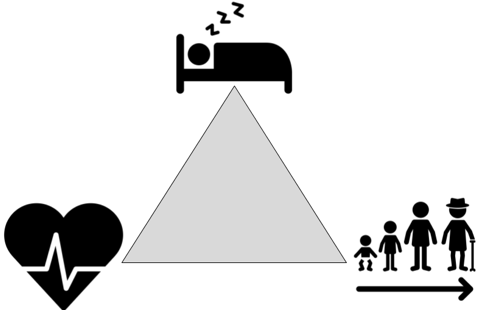Listen to Your Heart: What Cardiovascular Health Can Teach Us About Sleep
Spotlights ·Interview by Maedbh King
Vyoma Shah grew up in Mumbai, India and attended UC Berkeley where she majored in cognitive science. She is starting her third year in the psychology graduate program at Berkeley where she studies cognitive neuroscience. She is supervised by Prof. Matt Walker.

What drew you to study cognitive neuroscience?
I remember the first time I saw a real human brain and being amazed at how a 3 lbs. piece of flesh could produce the wondrous capabilities it does, from controlling my muscle movements, to allowing me to ponder my place in the universe. I increasingly found myself drawn to reading neuroscience/psychology blogs and articles during my free time, and I gradually developed a deep passion to better understand the workings of the brain. I’ve always wanted to pursue a clinical career that would have the potential to make a meaningful healthcare-related difference in the world. My current line of research is aimed at better understanding the relationship between sleep and cardiovascular health, and how these links change in old age.
What have you learned about the relationship between sleep and cardiovascular health in aging?
We know that different stages of sleep are associated with different forms of cardiac control. For example, the deepest stage of sleep is associated with high parasympathetic modulation and the lowest blood pressure in a 24-hour cycle. We also know that the composition of sleep itself is altered in aging; older adults get worse sleep. Currently, we are using different measures of cerebro and cardiovascular health (e.g. blood pressure, heart rate variability at rest and at stress, and brain white matter lesion volume) to investigate how each of them are linked to sleep quality and/or quantity, in young versus older adults.

How will your findings have real-world implications?
Cardiovascular disease is currently the leading cause of death in the world. Improving sleep quality and quantity can both alleviate negative cardiovascular risk factors (e.g. lower blood pressure) and improve positive cardiovascular health factors (e.g. increase heart rate variability). Relative to many other risk factors in aging, sleep stands out as a modifiable factor (via interventions to improve sleep), and to reduce the risk of cardiovascular diseases such as stroke, heart attack, cardiac attack, etc. This has tremendous implications for quality of life, public health, and cost of healthcare in the real world.
Finally, what advances would you like to see in your field in the next two decades?
There is currently fairly good awareness of three crucial pillars of actively maintaining good health: food, exercise and sleep. Currently, most people don’t immediately associate cardiovascular disease (e.g. heart attack, stroke, cardiac arrest) with sleep at all. Compare this to the regular association of heart health and food/exercise! My broad hope for the next few years is two-fold: 1) an increased awareness of the deep and strong bidirectional association between sleep and cardiovascular health, and 2) progress in the development of interventions to improve sleep, and subsequently, cardiovascular health.